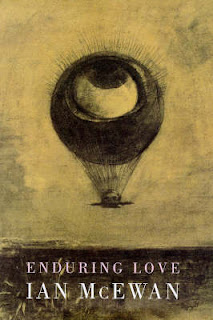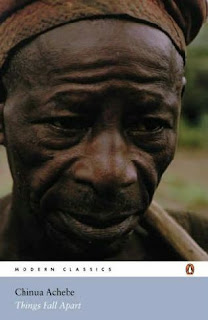 Title: Enduring LoveAuthor:
Title: Enduring LoveAuthor: Ian McEwan
Number of pages: 231
Started: 10 September 2009
Finished: 12 September 2009
Opening words: The beginning is simple to mark. We were in sunlight under a turkey oak, partly protected from a strong, gusty wind. I was kneeling on the grass with a corkscrew in my hand, and Clarissa was passing me the bottle - a 1987 Daumas Gassac.
This was the moment, this was the pinprick on the time map: I was stretching out my hand, and as the cool neck and the black foil touched my palm, we heard a man's shout. We turned to look across the field and saw the danger. Next thing, I was running towards it.
The transformation was absolute: I don't recall dropping the corkscrew, or getting to my feet, or making a decision, or hearing the caution Clarissa called after me. What idiocy, to be racing into this story and its labyrinths, sprinting away from our happiness among the fresh spring grasses by the oak.
There was the shout again, and a child's cry, enfeebled by the wind that roared in the tall trees along the hedgerows. I ran faster. And there, suddenly, from different points around the field, four other men were converging on the scene, running like me.
Read an extract
herePlot summary: Joe Rose has planned a postcard-perfect afternoon in the English countryside to celebrate his lover's return after six weeks in the States. To complete the picture, there's even a "helium balloon drifting dreamily across the wooded valley." But as Joe and Clarissa watch the balloon touch down, their idyll comes to an abrupt end. The pilot catches his leg in the anchor rope, while the only passenger, a boy, is too scared to jump down. As the wind whips into action, Joe and four other men rush to secure the basket. Mother Nature, however, isn't feeling very maternal. "A mighty fist socked the balloon in two rapid blows, one-two, the second more vicious than the first," and at once the rescuers are airborne. Joe manages to drop to the ground, as do most of his companions, but one man is lifted sky- high, only to fall to his death.
In itself, the accident would change the survivors' lives, filling them with an uneasy combination of shame, happiness and endless self-reproach. (In one of the novel's many ironies, the balloon eventually lands safely, the boy unscathed.) But fate has far more unpleasant things in store for Joe. Meeting the eye of fellow rescuer Jed Parry, for example, turns out to be a very bad move. For Jed is instantly obsessed, making the first of many calls to Joe and Clarissa's London flat that very night. Soon he's openly shadowing Joe and writing him endless letters. One insane epistle begins, "I feel happiness running through me like an electrical current. I close my eyes and see you as you were last night in the rain, across the road from me, with the unspoken love between us as strong as steel cable." Worst of all, Jed's version of love comes to seem a distortion of Joe's feelings for Clarissa.
Apart from the incessant stalking, it is the conditionals--the contingencies--that most frustrate Joe, a scientific journalist. If only he and Clarissa had gone straight home from the airport... if only the wind hadn't picked up... if only he had saved Jed's 29 messages in a single day... Ian McEwan has long been a poet of the arbitrary nightmare, his characters ineluctably swept up in others' fantasies, skidding into deepening violence, and--worst of all--becoming strangers to those who love them. Even his prose itself is a masterful and methodical exercise in defamiliarization. But Enduring Love and its underrated predecessor, Black Dogs, are also meditations on knowledge and perception as well as brilliant manipulations of our own expectations. By the novel's end, you will be surprisingly unafraid of hot-air balloons, but you won't be too keen on looking a stranger in the eye.
What I thought:I sort of enjoyed this book. It was a fairly interesting plot that looked at the ramifications of a tragic ballooning accident. But I didn’t find it entirely credible and I also was not always convinced that I liked the authors tone – a bit too pompous and knowledgeable (although I was unsure if this was partly because of what the main character was like or if all of McEwan’s books are like that). It was an interesting tale of obsession, but I did have to allow myself to suspend my scepticism to read it to the end. I don’t think I was entirely convinced. I am not sure if I would read more by this author or not, it left me with mixed feelings.








